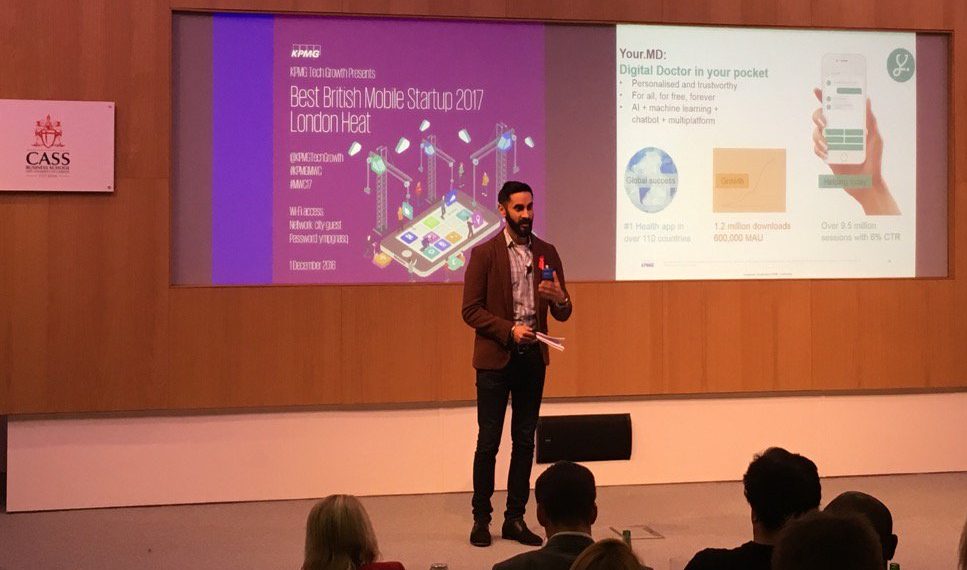Show of hands: How many of you have checked your symptoms online before? For those of you who have, how confident were you in the potential diagnoses you found? And was it enough to keep you from visiting a physician?
These are all questions London-based Your.MD, a booming AI health information service, wants to put to rest.
Mario Alemi, Chief Data Office of Your.MD, told Access AI that “[t]urning to Google is the worst possible place to try and diagnose yourself. The information is not regulated and may not be correct. The advice could be harmful both physically and potentially mentally.”
This is why Your.MD was founded. Although they’ve been steadily raising money since 2013 (the latest round of $10 million in venture funding came from Orkla Ventures in June 2017), the app was launched at the end of 2015. Since then, Your.MD has been downloaded by 2.1 million people on iOS and Android; a number which does not include the people who use this service through messaging services like Skype, Messenger, and Slack.
“This investment [from Orkla] is going to support the next phase of development of our vision: providing the best health information everyone needs, for free,” said Matteo Berlucchi, the CEO of Your.MD.
While that seems like the ideal outcome, we can’t help but wonder how exactly Your.MD will be any different than the likes of WebMD or the plethora of health apps already available.
What Makes Your.MD Different?
At first glance, Your.MD appears to offer something similar to other symptom checker and health assessment apps. However, this app is AI-driven. Users have a choice as to whether they want to search for their symptoms or discuss them through a chat prompt with a bot. This is self-driven health care, but unlike other symptom checker tools, this one involves more hand-holding.
The bot works with information provided by doctors and verified by the United Kingdom’s National Health Service to give users a potential diagnosis. With more personalized information provided by the user—such as data related to their location, age, gender, drug and alcohol usage, and so on—the more accurate the app’s results will be.
According to Alemi, the process and ensuing diagnosis have proven to be about 80% accurate. This is something he believes no one else in this space has been able to achieve.

He explained, “Seeing a doctor is not always that simple. People have busy lives and they can’t always get an appointment at a time that suits them. This provides them with an extra option and gives them more control over the way they manage their own health.”
It’s not just about scheduling conflicts either. Your.MD has proven to be an extremely valuable AI health tool for people in developing countries who don’t have access to health care, enabling users to manage their own pre-primary care to assess whether physician intervention is even necessary.
Of course, Your.MD won’t be able to sustain this free app model for long without offering some attractive upsell opportunity. And that upsell has come in the form of OneStop Health. Once Your.MD helps users obtain information on their potential diagnosis, that’s where most of the free part of this health service ends. If users want to get connected with health service providers to seek out confirmation of diagnoses or treatments, they can then pay OneStop Health to provide recommendations.
Getting the Medical Community’s Buy-In
While it’s clear that users appreciate what the app does for them, how do medical professionals feel about it?
When surveyed about providing patients with a mobile health app, only 36% of doctors around the globe believed that putting one into the hands of patients was a good idea. There wasn’t any further elaboration on why only a third of doctors feel this way, though it’s safe to assume that part of it has to do with the effect it’ll have on their stream of revenue as well as the potential for harm patients may inflict upon themselves by mismanaging their own symptoms and treatment.
However, studies have shown that many primary care visits aren’t totally necessary. A 2007 study revealed that 90% of general practice visits were for minor conditions, 88% of which could have been treated at home.
Nicolas Roope suggests that apps like Your.MD are a much-needed solution for both the patient and physician:
“Seventy percent of doctors in the UK report they don’t have time to do their job. For some time patients have gotten used to their doctors looking up symptoms on their PCs, which leaves many wondering why the medical profession hasn’t followed banking and many other services and cut the need for physical premises,… enabling what everyone now knows to be standard procedures in smart phone-app-land.”

With patients on board, it’ll be interesting to see what happens with the medical community’s acceptance (or rejection) of this service. It’ll also be interesting to see if this sort of pre-primary care app has any kind of negative effect on the health of its users. Though data may be sparse on that, we’re sure medical professionals will have a lot to say about it. So stay tuned.

